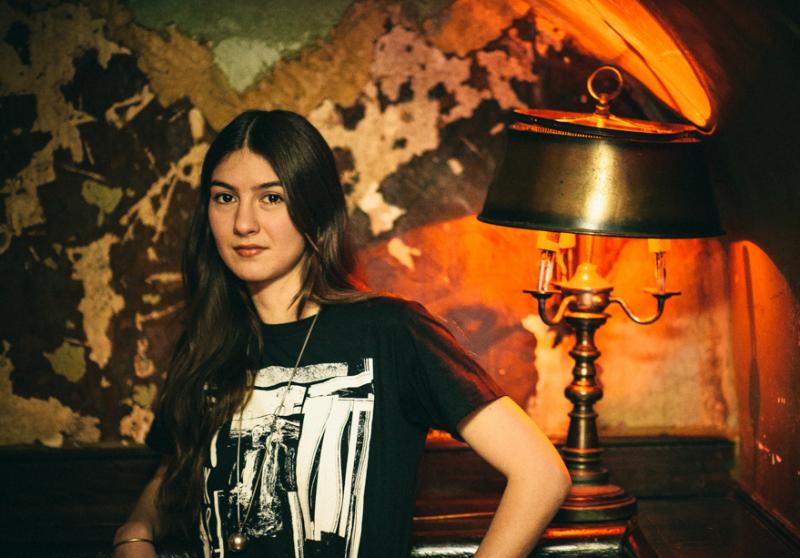Weyes Blood, The Old Blue Last | reviews, news & interviews
Weyes Blood, The Old Blue Last
Weyes Blood, The Old Blue Last
Sublime blend of acoustic folk and Goth-flavoured electronica comes to Shoreditch

Pennsylvanian singer-songwriter Natalie Mering, aka Weyes Blood, performed her intoxicating brew of Gothic folk-tronica in Shoreditch last night, as part of a short UK tour playing the songs of her second album, The Innocents. Allusive, multi-layered (both in terms of tracks and themes), generically ambiguous and wryly humorous, she wasn’t perhaps an obvious choice for a lagered-up Saturday night crowd wanting boogie beats.
Her voice is rich and deep, almost a baritone, though it never loses an intense sensuality. In the US she plays live with a backing band (see below), but funds have dictated this be a solo tour with laptop. She samples her voice and accompanies herself, giving a rather beautiful, haunting choral effect. Last night this was done quite subtly via loop pedal, though on the album there are passages of elaborate polyphonic effect. For a small event like last night’s the simpler version works well, drawing attention to the fine timbre of her voice.
Her stage name apparently draws on the febrile religiosity of Flannery O’Connor’s 1952 novel Wise Blood, and in songs like “Bad Magic” and “Requiem for Forgiveness” there’s a strong sense of supernatural awareness. It’s not expressed very explicitly, and acts as a musical flavour more than a theme. Her outfit, a full-length turquoise lycra catsuit under a pristine short white dress, emphasised the otherworldliness of her act (that, or she’ll be making her debut at Wimbledon later this year), rather than its folksiness. When performing, she’s refreshingly self-contained, without the look-at-me antics of many singers, her eyes closed, as if contemplating a higher reality.
 Mering is now 26, and The Innocents was released last October to widespread praise, but she’s some way from being a household name. She’s hard for publicists to pigeonhole, and has ploughed a determinedly independent furrow, dropping out of college to write and perform, and spending much of the rest of the time on alternative, find-yourself projects like herbology and maple syrup production.
Mering is now 26, and The Innocents was released last October to widespread praise, but she’s some way from being a household name. She’s hard for publicists to pigeonhole, and has ploughed a determinedly independent furrow, dropping out of college to write and perform, and spending much of the rest of the time on alternative, find-yourself projects like herbology and maple syrup production.
Largely a recital of The Innocents, she waited until nearly done for a big surprise, a startlingly original version of Fred Neil’s “Everbody’s Talkin’”. In the wrong hands a bland, jangling, feelgood piece, by bringing down both tempo and pitch to a droning baritone she drew out the darker implications of lines such as “I can't see the faces/ Only the shadows of their eyes” brilliantly. Fred Neil had a similarly publicity-shy profile to Mering’s, spending much of his life on dolphin conservation; there’s a very rich vein of covers to tap from similar artists who need familiar veneers stripping off.
She may be able to tap syrup from a maple tree, but she can’t, to her evident bemusement, yet get much of a reaction from a British audience. (Someone really needs to explain this to visiting American musicians – their disappointment at our sullenness is always painful to observe.) She’s an unusually original talent, however, with an act that takes in pop themes of romance, the folkie’s sense of place and relationship to the environment, and a vaguely Gothic interest in religion and the supernatural, all in a style that’s evenly dependent on acoustic skill and electronic effects. Anyone interested in thrilling new musical sounds needs to tell her to leave those maple trees alone and get writing.
rating
Explore topics
Share this article
Add comment
The future of Arts Journalism
You can stop theartsdesk.com closing!
We urgently need financing to survive. Our fundraising drive has thus far raised £49,000 but we need to reach £100,000 or we will be forced to close. Please contribute here: https://gofund.me/c3f6033d
And if you can forward this information to anyone who might assist, we’d be grateful.

Subscribe to theartsdesk.com
Thank you for continuing to read our work on theartsdesk.com. For unlimited access to every article in its entirety, including our archive of more than 15,000 pieces, we're asking for £5 per month or £40 per year. We feel it's a very good deal, and hope you do too.
To take a subscription now simply click here.
And if you're looking for that extra gift for a friend or family member, why not treat them to a theartsdesk.com gift subscription?
more New music
 The Last Dinner Party's 'From the Pyre' is as enjoyable as it is over-the-top
Musically sophisticated five-piece ramp up the excesses but remain contagiously pop
The Last Dinner Party's 'From the Pyre' is as enjoyable as it is over-the-top
Musically sophisticated five-piece ramp up the excesses but remain contagiously pop
 Moroccan Gnawa comes to Manhattan with 'Saha Gnawa'
Trance and tradition meet Afrofuturism in Manhattan
Moroccan Gnawa comes to Manhattan with 'Saha Gnawa'
Trance and tradition meet Afrofuturism in Manhattan
 Soulwax’s 'All Systems Are Lying' lays down some tasty yet gritty electro-pop
Belgian dancefloor veterans return to the fray with a dark, pop-orientated sound
Soulwax’s 'All Systems Are Lying' lays down some tasty yet gritty electro-pop
Belgian dancefloor veterans return to the fray with a dark, pop-orientated sound
 Music Reissues Weekly: Marc and the Mambas - Three Black Nights Of Little Black Bites
When Marc Almond took time out from Soft Cell
Music Reissues Weekly: Marc and the Mambas - Three Black Nights Of Little Black Bites
When Marc Almond took time out from Soft Cell
 Album: Mobb Deep - Infinite
A solid tribute to a legendary history
Album: Mobb Deep - Infinite
A solid tribute to a legendary history
 Album: Boz Scaggs - Detour
Smooth and soulful standards from an old pro
Album: Boz Scaggs - Detour
Smooth and soulful standards from an old pro
 Emily A. Sprague realises a Japanese dream on 'Cloud Time'
A set of live improvisations that drift in and out of real beauty
Emily A. Sprague realises a Japanese dream on 'Cloud Time'
A set of live improvisations that drift in and out of real beauty
 Trio Da Kali, Milton Court review - Mali masters make the ancient new
Three supreme musicians from Bamako in transcendent mood
Trio Da Kali, Milton Court review - Mali masters make the ancient new
Three supreme musicians from Bamako in transcendent mood
 Hollie Cook's 'Shy Girl' isn't heavyweight but has a summery reggae lilt
Tropical-tinted downtempo pop that's likeable if uneventful
Hollie Cook's 'Shy Girl' isn't heavyweight but has a summery reggae lilt
Tropical-tinted downtempo pop that's likeable if uneventful
 Pop Will Eat Itself's 'Delete Everything' is noisy but patchy
Despite unlovely production, the Eighties/Nineties unit retain rowdy ebullience
Pop Will Eat Itself's 'Delete Everything' is noisy but patchy
Despite unlovely production, the Eighties/Nineties unit retain rowdy ebullience
 Music Reissues Weekly: The Earlies - These Were The Earlies
Lancashire and Texas unite to fashion a 2004 landmark of modern psychedelia
Music Reissues Weekly: The Earlies - These Were The Earlies
Lancashire and Texas unite to fashion a 2004 landmark of modern psychedelia

Comments
It looks like you did not